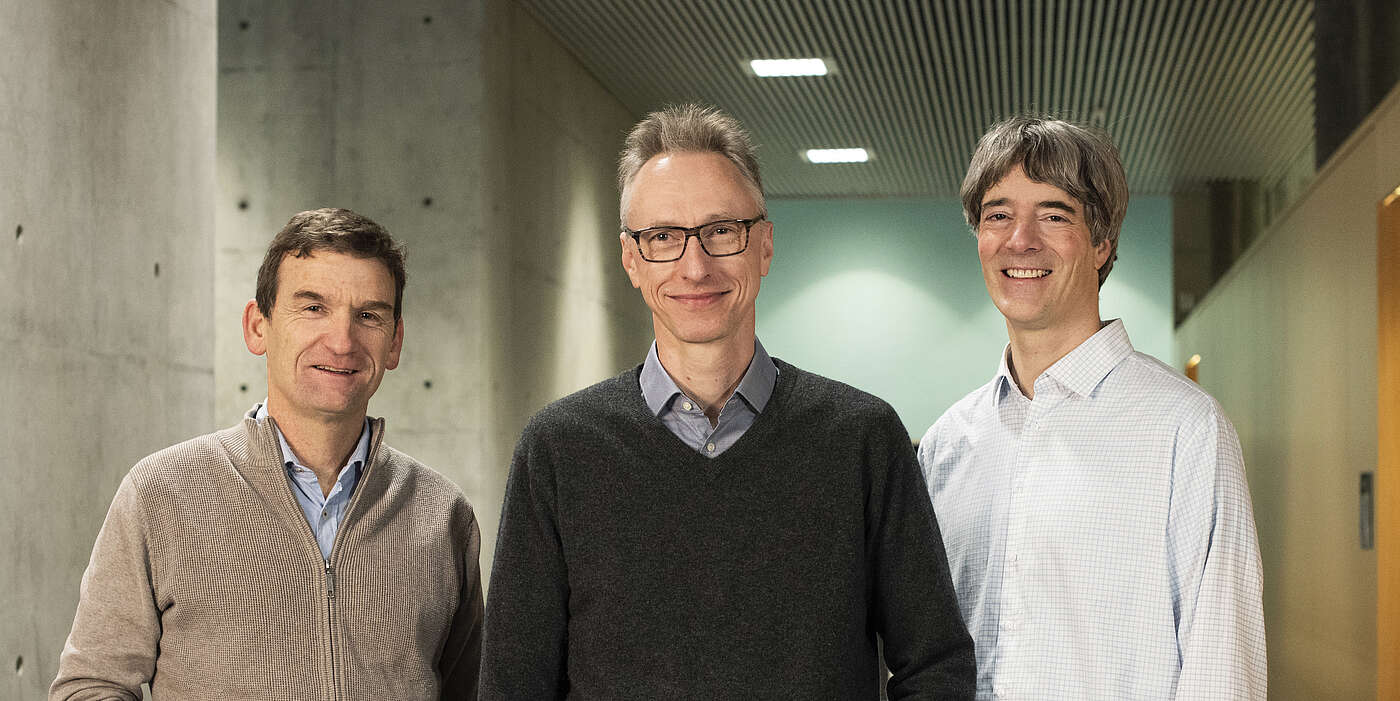The objectives of the National Center of Competence in Research (NCCR) "AntiResist" are to search for new antibiotics and to develop alternative strategies to combat antibiotic-resistant pathogens. "AntiResist" is one of a total of six new NCCRs presented today by the Swiss Federal council in Bern.
"AntiResist" will be headed by Prof. Christoph Dehio and supported by the Deputy Directors Prof. Dirk Bumann and Prof. Urs Jenal. All three are infection biologists at the Biozentrum of the University of Basel. 24 research groups will collaborate on the research project. At the core of the NCCR are 14 research groups in Basel working at the Biozentrum, the University Hospital/Department of Biomedicine and the Department of Biosystems Science and Engineering (D-BSSE) of the ETH Zurich in Basel.
On the new campus "Schallemätteli", these groups will conduct research in immediate proximity to each other. Further research groups are located in Zurich (ETH, University of Zurich and University Hospital Zurich) and Lausanne (EPFL and University of Lausanne). An international research team from the Ben-Gurion University in Beersheba, Israel, is also part of this network. The Swiss National Science Foundation (SNSF) is supporting the NCCR in its initial funding phase from 2020 to 2023 with 17 million Swiss francs.
Bacterial pathogens in humans provide new clues
Antibiotic-resistant pathogens are an increasingly growing problem in daily clinical practice. Particularly infections caused by multidrug resistant pathogens can only be treated with the greatest efforts, if at all. As a result, important routine medical procedures such as surgery, cancer treatments and organ transplantation suddenly become a considerable risk again. "Our once well-equipped arsenal of effective antibiotics is becoming limited, as conventional drug development is no longer able to provide the urgently required new medications," says the designated NCCR Director Christoph Dehio. "The previously successful strategy of developing antibiotics under artificial laboratory conditions has been exhausted – it is high time for a paradigm shift in drug development towards a patient-oriented approach."
Bacteria in the tissue of infected patients are exposed to an environment which is fundamentally different from artificial laboratory conditions. Since bacteria react flexible to environmental conditions, they most probably have completely different characteristics in patients than in the laboratory. "However, only little is known about the physiology of pathogens in patient tissue. In order to change this, close cooperation is necessary between basic research scientists and clinicians," explains Christoph Dehio. "Our initial goal is to more comprehensively understand the state of the bacteria in the human body, in order to find its Achilles heel. This opens up new ways and means to combat pathogens in the future," says Christoph Dehio.
The three phases of "AntiResist"
The funding of an NCCR extends over a total of three funding phases of four years each. "AntiResist" has established the following research focus for each of the three phases:
In Phase 1 "From conditions in the patients to laboratory models", the focus is on four critical bacterial pathogens that are particularly relevant for the clinic. For this purpose, the researchers will use patient samples from clinical studies at the University Hospitals of Basel and Zurich and investigate these with the aid of cutting-edge analytical methods.
In Phase 2 "From laboratory models to screening platforms", tissue models will be developed that recapitulate conditions as in infected patients. The establishment of high-throughput screening platforms by engineering partners at the D-BSSE serves the search for new drugs.
The goal of Phase 3 "Implementation in drug discovery, development pipelines and clinics" is to develop the identified compounds for novel therapies in close collaboration with industry and hospitals.
Interdisciplinary network in Basel – the key to success
Then NCCR "AntiResist» pursues a worldwide unique, interdisciplinary, research approach, involving the participation of clinicians, biologists, engineers, chemists, computer scientists and drug developers. This brings together critical expertise from completely different research disciplines that optimally complement each other in order to tackle one of the major challenges of modern medicine.
Torsten Schwede, Vice President for Research at the University of Basel, is thrilled about the decision from Bern: "The strength of these two NCCRs lies in the fact that they conduct coordinated cutting-edge research to address highly relevant issues that will enable our society to take further steps into the future. The NCCR 'AntiResist' will enable us to create the scientific conditions for the development of urgently needed antibiotics, strengthen an important life sciences research location for our region, and develop innovative technology for biomedical research."
Prof. Alex Schier, Director of the Biozentrum of the University of Basel, is equally as enthusiastic about the Federal Council’s decision: "Since our founding in 1971, microbiology and later infection biology have been major strengths of the Biozentrum. 'AntiResist' will help us write the next chapter in this history. I am particularly pleased that we are tackling the problem of antibiotic resistance together with our outstanding partners."
“We’re delighted that the federal government approved both our applications,” says the University’s President, Professor Andrea Schenker-Wicki. “It not only vindicates our scientific achievements to date, it also signals the future. Both projects align with our approach of linking basic research and application more closely, positioning the University of Basel regionally and internationally as a top-class research center and an attractive partner for industry.”
National Center of Competence in Research
The National Centres of Competence in Research are funded by the Federal Government and comprise research projects over several years on topics of strategic importance for science, industry and society. The newly approved NCCRs are the result of the fifth call for proposals.
In 2018, a total of 54 applications were submitted. After scientific review by the SNSF, the Federal Department of Economics, Education and Research (WBF) has decided to launch six new NCCRs. "AntiResist" is the first NCCR which is primarily located at the Biozentrum of the University of Basel.
NCCR "AntiResist" landing page, University of Basel
Contact: Communications, Heike Sacher



